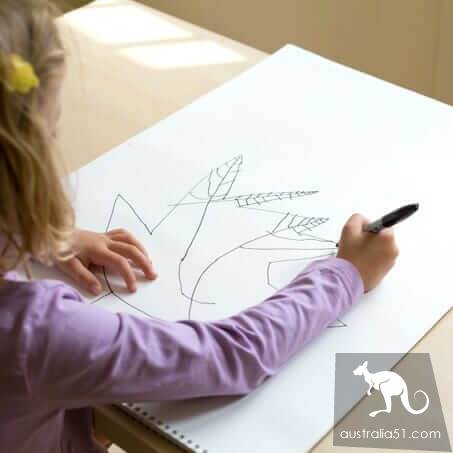
Let children practice painting with a variety of materials to help them develop fine motor skills. (network Pictures)
In a twinkling of an eye, 2019 is coming to an end. Have you considered letting your children go to primary school next year? Starting school is a whole new stage in children`s lives, and they will go from kindergarten or at home to the wider world-schools to undergo experience, which will also face many challenges. As a parent, you may always hear the word "(school readiness) for admission", but what does it really mean? Knowing all about school preparation will help you better prepare for school with your children.
What is "ready for admission"?
"Preparedness" is a measure of knowledge, skills and behavior, which enables children to participate in school activities and adapt to the life and rhythm of school. Parents sometimes think that preparing a child to go to school means listening, speaking, reading, writing and counting, or doing basic math before school.
But the truth is not so simple. "Preparedness" is about the overall development of children-their social and emotional skills, physical skills, communication skills and cognitive skills. If children do not develop skills to deal with issues such as getting along with other children, following instructions from teachers and having communication needs, it will be difficult for them to flourish at school and have a pleasant career in school.
Studies have shown that children who are ready for all aspects of development at school perform better at school, which lays the foundation for their future success.
How to judge that you are ready for admission
Children`s "school preparation" includes many different skills and behaviours, including the following:
- Social skills: be able to get along with other children, show basic politeness, stick to your point of view, play independently, and play with other children.
- Mental maturity: be able to manage your emotions, focus on tasks, follow the instructions of your teacher, cope with the pressure of the new school environment, and understand the rules.
- Language skills: can listen to adults and other children, speak clearly, communicate their needs, understand the story told, and begin to recognize some letters and sounds.
- Cognitive ability: have basic digital concepts and thinking skills, have the consciousness of taking turns and waiting.
- Good health and coordination skills: basic health, good sports skills (such as ability to hold pens and flip books) and physical coordination skills (ability to run, jump, climb and play ball, etc.).
- Independence: be able to complete basic skills to meet your needs without adult supervision, such as going to the toilet, dressing, opening lunch boxes, and managing your own items.
If you`re not sure your child is ready to go to school, talking to your child`s kindergarten teacher or early child educator will help you assess whether your child is ready for school.
Parental Role
Although some commercial "school preparation" programs for preschool children are becoming more and more popular, these are usually unnecessary. Children can learn better in play. Here are some tips to help your child better prepare for school:
Try to arrange for children to play with other children in the same school. This gives children the opportunity to develop social skills and gives them confidence to have a friend to talk to when they start school.
* ask children to practice painting with a variety of materials, such as pencils or crayons, to help them develop fine motor skills-remember to praise their efforts.
* encourage children to dress and undress themselves and go to the toilet independently.
: encourage your children to talk to you-ask them questions, listen to their answers, and encourage them to talk about their thoughts and feelings so that they can express their ideas in front of new friends and teachers.
* read as much as possible with your children. If your child already has some reading skills, of course it`s great. But if not, don`t worry, the school will teach them how to read. Reading with children helps to develop children`s early reading and writing skills, as well as their love of reading. When you read with your children, talk to them about stories, point out new words, and ask questions-which will help them understand the content, learn vocabulary and exercise language skills.
: develop children`s basic understanding of numbers by asking them to help with housework-they can set tables, count plates, take socks from clotheslines, or measure some baking ingredients.
* Children play games together-simple board games and card games are a good way to practice waiting in turns, sharing and learning how to face failure.
Each child has his or her own speed, strengths, interests, personality and learning methods-so don`t worry if your child doesn`t show these "school preparation" skills and behaviors. If you have any concerns about your child`s growth, talk to a teacher or early child educator, or a family doctor-they will be able to provide assessment and advice.

